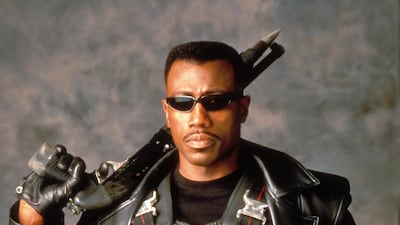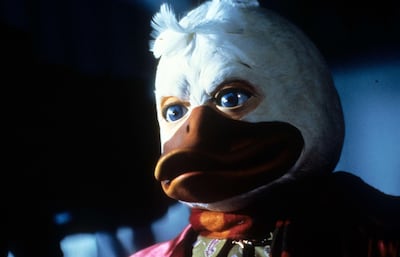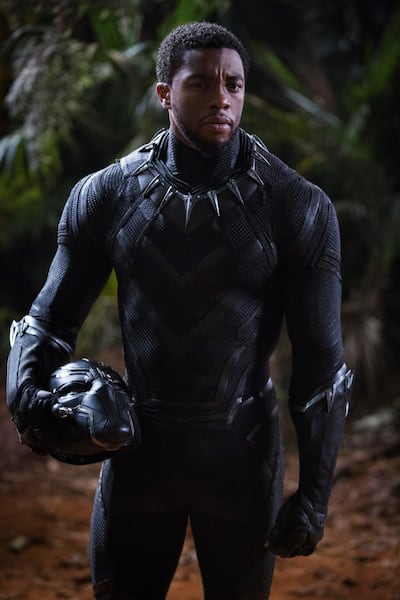A long time ago, in a galaxy not so far away, there was a point at which Marvel Studios wasn't the Disney-allied behemoth we know and love today, but rather a not-entirely-successful offshoot of a comic book publisher with decidedly little in the way of cinematic achievements to boast of.
Arch-rival DC has been a hit for many decades with the Superman and Batman franchises. Richard Donner's first Superman movie debuted in 1978. Meanwhile, Batman was a corny success in the 1966, Adam West-starring cinema version, and a critical success via Tim Burton's darker take on the subject matter, beginning in 1989. But by 1998, Marvel was still sitting on something of a cinematic wasteland.
Spider-Man had been optioned in the late seventies, but a film never materialised. Likewise, a 1994 film version of The Fantastic Four, produced by low-budget specialist Roger Corman, was made, but never released.
Strangely, the first Marvel property to make it to big screens was the largely unknown Howard the Duck in 1986.
That bombed, as did 1989's Dolph Lundgren-starring, straight to video, The Punisher. Then, in 1998, came Blade. The Wesley Snipes movie was just a minor success by the current behemoth Marvel standards, grossing just over US$200 million (Dh734.5m) worldwide, but it was a marker, and the first teetering step on the road to creating the juggernaut that is the current Marvel Cinematic Universe.
Click to watch the trailer for Blade:
The film has since gone on to attract a cult following of vampire loving obsessives, and today, on August 21, we celebrate 20 years since its initial release in cinemas. Blade was the first time Marvel managed to portray itself as "cool" in cinemas – certainly not an accusation that could be levelled at Howard the Duck.
Snipes’s vampire-hunting, leather-clad hero had all the swagger of James Dean, the film was visually arresting and it featured a totally on-point soundtrack of hip hop and alt-rock from the likes of KRS-One and New Order.
It was also the very first time a black man had fronted a major superhero movie. 2018's Black Panther has received plenty of plaudits for its huge steps in terms of diversity, and rightly so, but on a technical level at least, Blade takes the crown here. Admittedly, the film lacks the political subtext of Black Panther: the vampire slayer has no great statement to make about civil rights or diversity, he just kills vampires.
Blade could easily have been played by a white actor, as long as he was able to meet the challenge of being as broodingly cool as Snipes, but he wasn't, he was played by Snipes. Blade was black in the comics, and, appropriately, black on the screen. So, with all due respect to Black Panther, apologies – you were great, but history will remember Blade as the first.
A reboot has long been touted, however, although Snipes has suggested he’d be keen to reprise his role, perhaps Idris Elba should stop teasing fans with Bond rumours and tweet a pic of himself in a leather trench coat with a samurai sword? (In fact, in the comic books, Blade was British).
The film spawned two sequels, in 2002 and 2004, and although Blade has never been integrated into the Marvel Cinematic Universe, he remains to this day, probably the coolest Marvel character on screen. There’s none of Captain America’s cheesy wholesomeness, nor Deadpool’s one-liners. In fact, he’s probably the closest thing Marvel has to DC’s uber-cool Batman – a leather-clad, sword-wielding, vampire-slaying goth with no time for humour, and soundtracks that retained their cred throughout the series, with artists such as Fatboy Slim, The Crystal Method and RZA treating our ears in the later films.
So, happy 20th birthday Blade. It may be 14 years since you last graced our screens in 2004's Blade: Trinity, but you're still going strong in Marvel's comics. He last appeared regularly in 2008's Captain Britain and MI13, while a whole new Blade series was written in 2015, though it currently remains unpublished.
The reboot, meanwhile, is a recurring rumour among the comic fan fraternity, so it’s good to know that, with Blade still out there, we can sleep sound at night with no fear of the teeming vampire hoards.
The best of the rest
With critics and fans alike constantly debating the Marvel-DC rivalry in cinemas, it’s easy to forget that there are comic books out there – and films based on those comic books – that don’t come from either of these publishing empires. We remember the best of the rest …
Dredd (2012)
Directed by Pete Travis and scripted by The Beach's Alex Garland, this 2012 take on 2000 AD's one-man judge, jury and executioner, Judge Dredd, is an underrated masterpiece. Karl Urban plays the chisel-chinned lawman in a movie that owes more to films such as 2011's Indonesian bloodbath The Raid than traditional superhero fare. Sadly, the film fared poorly at box offices, in large part thanks to distributor Lionsgate's bizarre decision to only screen it in 3D in its United Kingdom home market. Dredd still topped box offices in the UK on release, but how much more it may have taken with a traditional 2D release, we'll never know. Despite online campaigns and Karl Urban's eagerness to reprise the role, Garland's script for the sequel, which promises to introduce the iconic villains The Dark Judges to screens, remains unmade. If you do decide to watch the movie, do yourself a favour and make sure you don't accidentally tune into the 1998 Judge Dredd starring Sylvester Stallone. That film is truly terrible.
Ghost World (2001)
Daniel Clowes' graphic novel was serialised by Fantagraphics Books between 1993 and 1997, and quickly attained cult status. Terry Zwigoff's 2001 film version brought Thora Birch and Scarlett Johansson to screens as high school outcasts Enid and Rebecca, with Steve Buscemi as Seymour, an older man who Enid befriends, thanks to a shared love of vinyl records. There are no superheroes or special effects in Ghost World. In fact, very little happens at all, which is kind of the point, as our heroines dream of a life better than the one they have in small town America. The film went largely unnoticed at box offices, just covering its US $7 million (Dh25m) budget, but it was a hit with critics and on the festival circuit, and a Best Adapted Screenplay Oscar nod suggests I'm not alone in my love of Zwygoff's film.
Hellboy (2004)
The Shape of Water director Guillermo Del Toro turned his hands to Dark Horse Comics' half demon superhero Hellboy, played by Ron Pearlman, in 2004, and again in a 2008 sequel that Del Toro obsessively lobbied to fund. The loveable, red-skinned denizen of the dark layer is inadvertently summoned to earth as a child by Nazi occultists with a demonic plan to win the Second World War. Hellboy, it turns out, is the wrong demon, and when he grows up, he dedicates his life to fighting Nazis, demons, and assorted other baddies, while engaging in a spot of demonhuman romance with psychic pyromaniac Liz Sherman, played by Selma Blair.
Sin City (2005)
Robert Rodriguez joined forces with Frank Miller, the author of the 13-part, 1991 Dark Horse Comics-published Sin City to co-direct 2005's neo-noir film adaptation, and again for the 2014 sequel Sin City: A Dame to Kill For. The films, like the comic, are an anthology of short stories from the underworld of the fictional Sin City, sometimes crossing over with each other's storylines. The first film is largely based on issues one, three and four of the series, while the sequel turns largely to issue two. The anthology nature of the movies means we're treated to an ensemble cast, including Bruce Willis, Mickey Rourke and Jessica Alba, and visually, the highly stylised movie represents perhaps the most artistically accurate attempt to translate a comic book to the screen to date.
Oldboy (2003)
Park Chan Wook, possibly South Korea’s most accomplished filmmaker, was behind the camera on this ultra-violent adaptation of the Japanese Manga comic, which originally ran from 1996 to 1998. In it, Choi Min Sik stars as Oh Dae Su, a man who has been inexplicably locked up in a mysterious private prison for 15 years, ever since he was arrested for drunkenness in 1988. In 2003, he is drugged in his cell and wakes up on a rooftop, wearing a suit, with no idea where he is, or why he has spent the past 15 years locked up. Unsurprisingly, he embarks on a brutal mission to find out the truth and take vengeance on his captors, and having spent 15 years training in shadow boxing in his cell for wont of anything better to do, he’s a lethal opponent. The film picked up the Grand Prix at Cannes in 2004, with jury president Quentin Tarantino, perhaps predictably, among its biggest fans. Spike Lee even turned his hand to a Hollywood remake in 2013, but honestly, it’s not his greatest moment.



